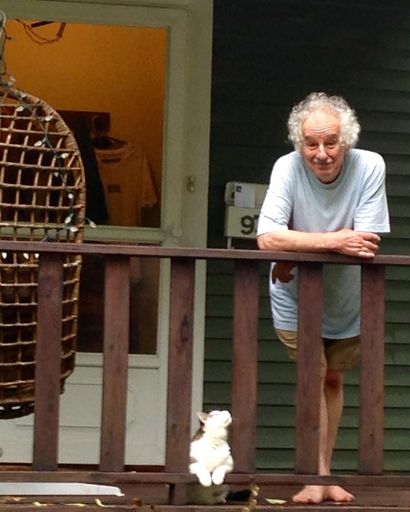
Fred Lessing
May 16, 1936 — April 7, 2025
Worcester, MA
Alfred “Fred” Lessing, born May 16, 1936 in The Hague, Netherlands, was a brilliant philosopher, teacher, and therapist; a loving and much-loved father, husband, brother, uncle, grandfather, and friend; an avid flutist, amateur lumberjack, and indomitable questioner of authority. His path was already unique from the horrors of the Holocaust to the halls of academe, from hidden child to father of two lovely boys—when it twined with that of another great iconoclast, Roz Sherman, the love of his life. Together, they charted new courses, reinventing themselves as therapists, parents, and much else through 47 years of marriage. Fred lovingly cared for Roz until her untimely passing in 2018.
Fred’s legacy is rich and multifaceted, but anchored in an unshakable humanism. Born into a family of musicians and painters, Fred first became a philosopher of art. In his seminal 1965 article—still taught and anthologized today—he argued that “What is Wrong with a Forgery?” is something essentially moral, not aesthetic. Throughout his tenure as a professor at Oakland University (joined on the faculty by Roz in 1969) and director of its experimental Charter College, he sought more direct and humane engagement with students grappling with real-life moral questions amidst the Vietnam war and Civil Rights Movement.
Ultimately, their frustrations with academia’s limits led Fred and Roz toward new careers as therapists, helping found the experimental COPRiN clinic in Southfield, Michigan. Though short-lived, CoPRiN produced lifelong connections; from its ashes, Fred, Roz, and colleagues built a thriving, humanistic psychotherapy practice, doing couples’ and group therapy as a team, and nurturing a warm and caring community of clients. Fred’s creativity and energy profoundly shaped Walden, a kind of summer camp for their clients, or as one of them put it, “a place where adults get to be kids”. Walden’s “experiment in living community” lasted more than a decade and touched hundreds of lives.
When a photo surfaced of Fred as a child in Amsterdam—amidst dozens of yellow-star wearing schoolchildren, and perhaps the only one to survive—he embarked on a new journey. He recorded oral histories of his nuclear family, which had miraculously survived intact; connected with other hidden children around the world (eventually finding another survivor from the Amsterdam photo); and retold his story for younger generations in schools and lecture halls. Accompanying him on these talks was the same teddy bear (a.k.a “Bear) that he had carried with him while in hiding in Holland. When Fred lent Bear to the US Holocaust Museum for an exhibit on hidden children, the pair won the hearts of all who saw them. Bear and Fred (seen in the Amsterdam photo) are now part of Yad Vashem’s permanent collection in Jerusalem, and inspired the children’s book Bear and Fred, now translated into five languages.
Through these varied legacies weaves a common thread, one Fred himself put to words:
I have a great fear and hatred for the rationalization of pain and oppression in the name of some (grown-up’s) conception of what is good, or holy, or necessary, or noble, or moral. No belief, no value, no dogma, nor principle—no abstraction—is ever more important than the freedom and dignity of a child. If we do not learn this from the Holocaust, we learn nothing.
Fred passed away before dawn on April 7, 2025, in his apartment in Worcester, MA. He was almost 89 years old. His children, grandchildren and great-grandson had seen him in the weeks prior, as he made a slow and mostly painless transition from this world. He is survived by his elder brothers Attie and Ed Lessing, 90 and 98 years old, and four children, Aaron, Josh, Ben and Shana. We all miss him dearly.
Photo Gallery
Guestbook
Visits: 52
This site is protected by reCAPTCHA and the
Google Privacy Policy and Terms of Service apply.
Service map data © OpenStreetMap contributors



